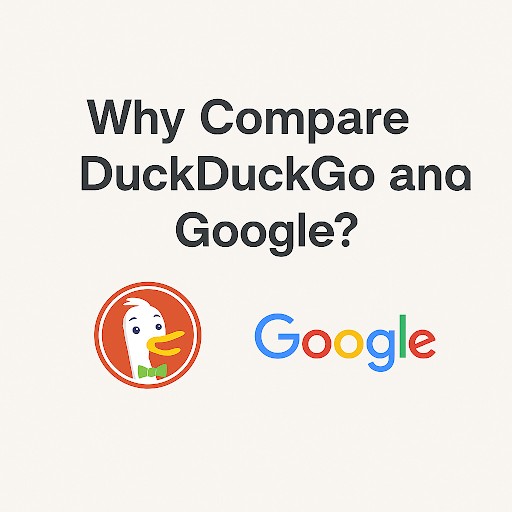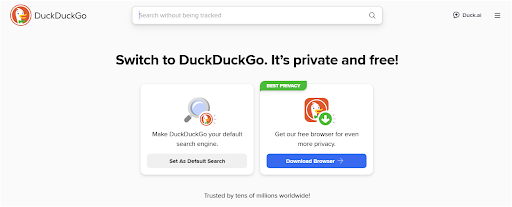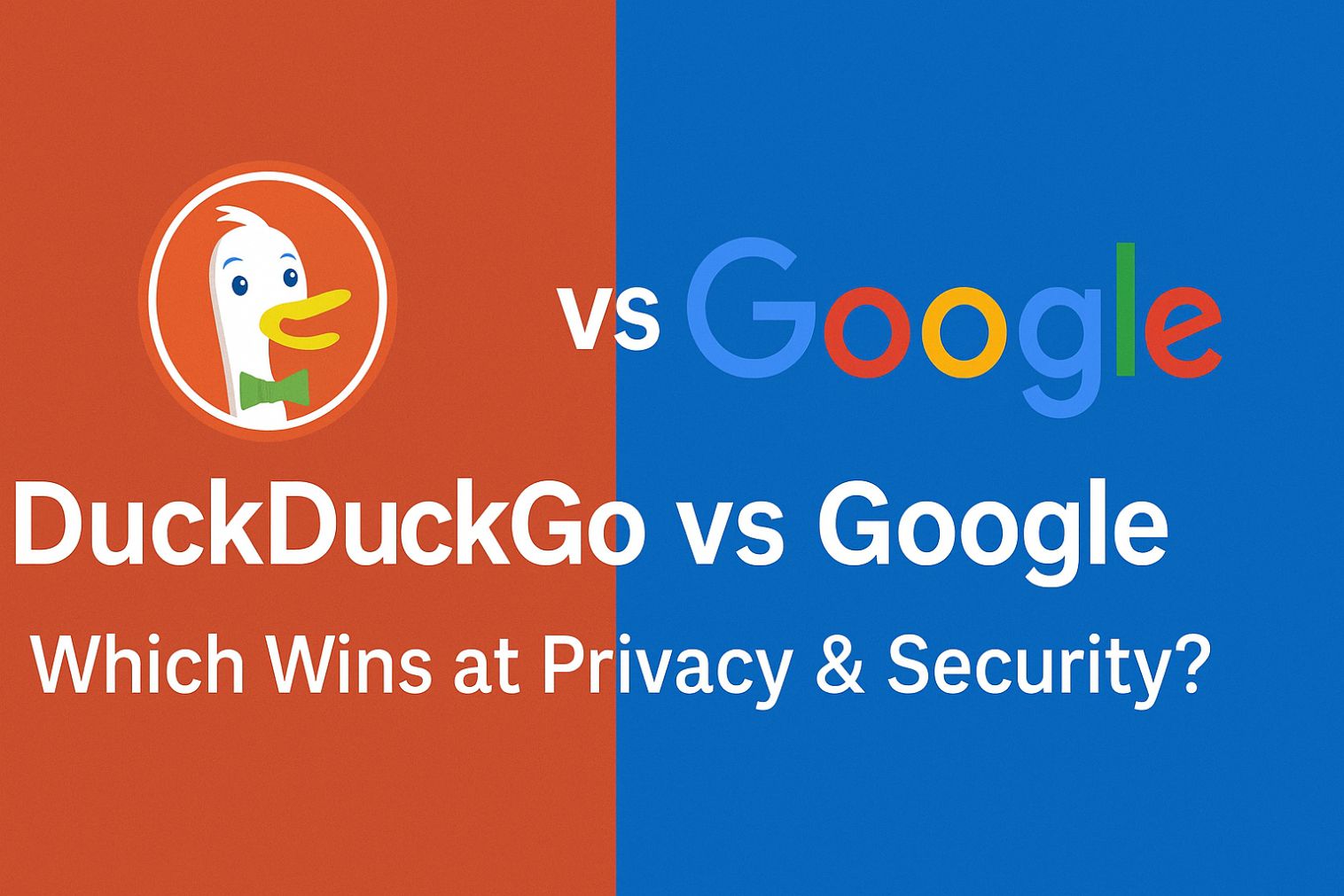In today’s digital age, privacy and security are at the forefront of our online activities. Whether you’re searching for the latest news, looking up recipes, or researching a new product, the search engine you choose plays a huge role in how your data is handled. Two of the most popular search engines—DuckDuckGo and Google—take distinctly different approaches to protecting your privacy. In this blog, I’m delving into the DuckDuckGo vs. Google debate, focusing on which one offers the best privacy and security. By the end of this, you’ll have a clear picture of which search engine suits your needs.
Why Compare DuckDuckGo and Google?

Both DuckDuckGo and Google are giants in the world of search engines, but they have fundamentally different philosophies regarding user data. Google has built an empire around data collection, using information to tailor its services, ads, and even search results.
On the other hand, DuckDuckGo positions itself as the privacy-first search engine that doesn’t track your searches or personal data.
When it comes to choosing a search engine that aligns with your privacy values, the differences between these two become clear. But does one outperform the other in terms of privacy and security? Let’s dive into it!
DuckDuckGo vs Google: Which is the Best for Privacy & Security?
1. Privacy Comparison: DuckDuckGo vs Google
 Image Credit- duckduckgo.com
Image Credit- duckduckgo.com
When we talk about privacy, the first thing that comes to mind is data tracking. So, let’s break it down:
- DuckDuckGo: One of the biggest selling points of DuckDuckGo is that it doesn’t track your searches or create a digital profile of you. Every search is treated like a new one—no search history, no personal data collection, and no tailored results. Your privacy is respected from the moment you search.
- Google: Google, on the other hand, collects vast amounts of data from your searches, web browsing, location history, and even what ads you click. This data is used to personalize your search results, ads, and other services. While Google offers privacy settings and data management tools, it’s clear that the company relies on user data to fuel its business model.
The Bottom Line: If privacy is your top priority, DuckDuckGo is the clear winner. It offers a truly private search experience, whereas Google’s data-driven approach means your privacy is often compromised.
2. Search Accuracy and Results: Which Engine Delivers Better Results?

Privacy isn’t the only factor you should consider when choosing a search engine. Search accuracy and results are important too. So how do DuckDuckGo and Google compare here?
- Google: Google is known for its advanced search algorithms, which are constantly refined to deliver the most relevant results. Google uses your search history, location, and other personal data to provide highly tailored search results. This means you get personalized recommendations, but it also means you’re constantly being tracked.
- DuckDuckGo: DuckDuckGo doesn’t personalize search results based on your data. Instead, it aims to deliver neutral and unbiased search results, which means that everyone gets the same results for the same query. While this can sometimes mean less tailored accuracy, it’s an excellent choice for those who prefer unfiltered results.
The Bottom Line: If you value accuracy and personalized search, Google leads the way. But if you’d rather have privacy and unfiltered results, DuckDuckGo is a solid choice.
3. Speed and User Experience: A Look at Speed and UI
While privacy and accuracy are crucial, speed and user experience also play a role in choosing a search engine. How do DuckDuckGo and Google compare here?
- Google: Google’s search engine is lightning-fast, providing quick, relevant results for almost any query. The user interface is sleek, intuitive, and offers a variety of features like search suggestions, related searches, and an easy-to-use layout.
- DuckDuckGo: While not as polished as Google’s interface, DuckDuckGo is still quite user-friendly. It’s easy to navigate, and the minimalist design keeps things simple. The speed is good, but Google has a slight edge when it comes to search responsiveness.
The Bottom Line: Google is the winner here in terms of speed and overall user experience, but DuckDuckGo holds its ground with a straightforward, privacy-first approach.
4. Security Features: How Safe Are Your Searches?

Both search engines boast a variety of security features, but their approaches are quite different.
- DuckDuckGo: DuckDuckGo is all about security, offering features like HTTPS encryption for secure browsing. Since the engine doesn’t track you, there’s less risk of exposing your data to third parties. DuckDuckGo also offers a Privacy Grade feature, which alerts you about websites that might compromise your privacy.
- Google: Google offers strong security measures too, such as two-factor authentication for accounts and safe browsing features in its Chrome browser. However, since Google collects so much data, there is always a risk that your information could be exposed, especially if Google’s services are hacked.
The Bottom Line: DuckDuckGo wins in terms of security, mainly because it doesn’t track your data in the first place, making it less susceptible to breaches or misuse.
5. Ads and Monetization: How Do Both Platforms Make Money?

If you’re using a free service, it’s likely being monetized in some way. Here’s how both DuckDuckGo and Google make money:
- Google: Google makes the majority of its revenue through ads, and these ads are heavily reliant on user data. Google uses your personal search data, online behavior, and interests to serve you targeted ads across the web. While you can manage your ad preferences, Google still tracks your data to deliver relevant ads.
- DuckDuckGo: DuckDuckGo also has ads, but they’re not personalized. DuckDuckGo’s ads are based purely on search queries, meaning no personal data is used to target you. Additionally, DuckDuckGo has affiliate partnerships (e.g., with Amazon) where it earns a small commission when you click on certain links, but this doesn’t involve tracking your activity.
The Bottom Line: If you’re looking for a search engine that doesn’t involve personalized ads based on your data, DuckDuckGo is your choice. Google is more robust but comes with the trade-off of data tracking.
FAQs: DuckDuckGo vs Google
1. Which is more secure, Google or DuckDuckGo?
DuckDuckGo is more secure when it comes to privacy because it doesn’t track your searches or store any personal data. Google, on the other hand, collects a vast amount of data about you to tailor its services, making it more vulnerable to potential data breaches. While Google does offer security features like two-factor authentication, it still tracks your activities across its platforms.
2. Is DuckDuckGo 100% private?
DuckDuckGo is very private compared to other search engines, but it’s important to note that it isn’t 100% private in every situation. It doesn’t track your searches, collect personal data, or create profiles, but third-party sites you visit may still collect information, such as via cookies. However, DuckDuckGo does block these trackers from third-party sites and ensures that your search history remains private.
3. Which search engine is best for privacy?
If privacy is your main concern, DuckDuckGo is the best choice. Unlike Google, DuckDuckGo doesn’t track your activity or create user profiles, offering a much higher level of privacy. Google, while secure in terms of features like encryption, relies heavily on tracking data to deliver personalized results and ads, which compromises your privacy.
4. Can I be tracked if I use DuckDuckGo?
Using DuckDuckGo makes it significantly harder for advertisers or third parties to track you compared to Google. However, DuckDuckGo doesn’t control the tracking on external websites you visit after performing a search. While DuckDuckGo doesn’t store or track your searches, the websites you visit may still use cookies or other tracking mechanisms. That said, DuckDuckGo actively blocks these trackers as much as possible.
5. Does DuckDuckGo really protect privacy?
Yes, DuckDuckGo does an excellent job of protecting your privacy by not collecting, storing, or sharing your personal data. It also blocks third-party trackers and enforces HTTPS encryption on websites, ensuring a more secure browsing experience. Unlike Google, which gathers user data for its services and advertising, DuckDuckGo prioritizes privacy above all else.
Conclusion: DuckDuckGo vs Google – Which One Should You Choose?
In the battle of DuckDuckGo vs Google, the winner depends on what matters most to you:
- Choose DuckDuckGo if privacy and security are your top priorities. With no tracking, no data collection, and a commitment to keeping your information private, DuckDuckGo offers the best experience for privacy-conscious users.
- Choose Google if you’re looking for highly personalized search results, advanced search features, and faster, more accurate results. Google excels in search performance and is a more polished overall experience, but your data will be tracked.
Ultimately, the decision is yours. If privacy is something you value above all else, DuckDuckGo is the better choice. If you’re okay with trading a bit of privacy for convenience, speed, and personalized results, Google might be the way to go.
Still undecided? Give both a try and see which one fits your needs best! Your online safety and privacy are in your hands—choose wisely!












